A VPN stands for Virtual Private Network. This service can change your IP address by connecting you to a remote server in another country. It routes your traffic through a secure VPN tunnel, encrypting it, and making sure no one can trace you online.
In other words, this tool’s primary function is to ensure your online security and privacy by preventing your ISP or any other entity from spying on your online activities. Despite this function being crucial, we see so many providers, especially free ones, not focusing enough on this goal.
In 2024, it’s somewhat hard to find a safe and reliable VPN that will fully adhere to these principles and truly make you 100% anonymous on the internet. However, in today’s article, I will alleviate this problem and make it easy to find the safest and most secure VPN for your needs.
Although there are a handful of providers that offer safety and security, we narrowed down our list to 5 services that we have used for more than a decade, and thus, can guarantee they’re legit and risk-free. Let’s take a deeper look at them and see which features a secure VPN must possess to be really safe.
The Most Secure VPN Services in 2024:
- ExpressVPN
- CyberGhost VPN
- NordVPN
- Surfshark
- Private Internet Access
Important Features of the Most Secure VPNs
Before I move on with my list and present the most secure VPNs, I think it’s necessary to clarify which features a provider like this must have in its arsenal. Once I do that, I can present the Virtual Private Networks that offer them, which will make the list much more relevant.
256-bit Encryption
The staple of every VPN service should be encryption. Encrypting your connection is the first and main step when talking about how a VPN works. Once you connect to a server, encryption is applied, which makes your online activities and your IP address invisible to your ISP, snoopers, and hackers.
Now, encryption can be stronger or weaker, depending on its type. Even though 128-bit encryption isn’t weak by any means, providers nowadays use 256-bit AES encryption to secure your connection. This is the highest level of encryption a user can get and is used in every premium VPN.
The most reliable providers rely on this encryption regardless of the protocols they offer. However, some premium services like PIA VPN, for example, let you lower the level of encryption to get better performance, which, in my opinion, you shouldn’t do.
Kill Switch
The next important feature of a safe and risk-free VPN is a kill switch. Remember what I’m going to say and keep it in your mind:
A VPN without a kill switch IS NOT SAFE!
A VPN kill switch is here to shut down your internet connection if your VPN connection is interrupted for any reason. It can be a server issue or instability, for example, in which case, your connection will be lost and your native IP and DNS addresses will be exposed.
Not with a kill switch. A kill switch will disable your internet connection the second this happens, making sure your IP and DNS addresses don’t leak to the public. This is how it preserves your safety and anonymity all the time, alas, at the expense of your internet connection.
IP/DNS Leak Protection
Speaking of your IP and DNS addresses, they’re crucial for your ISP to track your activities, impose restrictions, and employ bandwidth throttling. They’re even important for hackers who want to track your online activities and steal your personal data.
That’s why the most secure VPN must have additional measures for protecting your IP and DNS addresses. Even better is when a provider has IPv6/IPv4 leak protection, which will protect both types of IP addresses because some users use IPv6 and not the older IPv4 type of an IP.
As for DNS leak protection, there’s no special philosophy. It’s either there or it’s not. I recently reviewed FastestVPN, for example, and this provider constantly leaked my IP and DNS, making it one of the worst providers you can use for staying safe and secure online.
Secure VPN Protocols
When it comes to protocols, it’s obvious that a provider should have the most secure ones. Protocols dictate how a service will set up a secure tunnel for securing your connection, which is why some protocols are focused on speeds and some on security at the expense of performance.
In 2024, however, providers like ExpressVPN, CyberGhost, and NordVPN have protocols that manage to combine both and give you not only rock-solid security but also excellent speeds. We won’t go deeper into what each protocol means because we don’t want to make this article tiresome to read.
But in general, when discussing secure protocols, we’re thinking about these:
- Lightway (ExpressVPN’s proprietary protocol)
- NordLynx (NordVPN’s proprietary protocol based on WireGuard)
- WireGuard (An open-source protocol for better performance and security)
- OpenVPN (An open-source protocol for better security, with slower speeds than WireGuard)
- IKEv2 (An alternative to OpenVPN; offers faster speeds and it’s less secure than OpenVPN)
Later on, when I talk about the most secure VPNs in 2024, you’ll see that all of the providers offer at least two of these protocols.
Servers Based on RAM
Traditional HDD-based servers are known for slower speeds and vulnerability to cyber-attacks. The most reliable services nowadays use servers based on RAM, which is nothing else than the Random Access Memory you have in your PC, mobile device, Smart TV, and so forth.
The main thing about RAM is that it requires power to store data. If you shut down or restart a particular device, all the data stored in RAM is deleted, which is how RAM-based servers work. With each server restart, all data on the server is wiped out.
This is crucial for ensuring your privacy and making sure the provider has no data to hand out if it’s forced by the local authorities. High-quality premium providers offer this luxury, while free providers base their server infrastructure on traditional hard disks, making them far less secure.
Policy Against Logging
Last but not least, a no-logging policy is important to mention – if not THE most important. You can have all the security features you want, but if a provider keeps logs of your online activities, IP address, or anything else, all of these features are useless.
The most secure and risk-free providers are known for stringent no-logging policies, meaning they store minimal data needed only for the service to function. Information like your browsing history, IP/DNS addresses, DNS requests, timestamps, geolocation, and others will NOT be stored.
It’s even better if a provider has a certification from a third-party source, which confirms that the provider adheres to its no-logging practices. I recommend checking my article about VPNs that store no logs, where I discuss this subject in-depth and provide valuable info on how to choose a no-log service.
Bonus Security Features of the Safest & Most Secure VPNs
Some secure providers go out of their way to provide bonus security features in addition to the “basic” features we mentioned above. I won’t elaborate on them too much, instead, I’ll list them and explain them briefly, so that you know their role.
- Obfuscation (obfuscated servers). This feature is used for bypassing DPI (Deep Packet Inspection) in censored countries like China, Iran, Iraq, Russia, and Turkey. It makes your VPN traffic look like ordinary traffic, which is ideal for bypassing all types of firewall restrictions.
- Ad/malware/tracker blocker. This feature is blocking ads and malicious websites that can also track your activities and infringe on your privacy.
- Private DNS. This feature is a proprietary DNS service of a VPN provider, which routes your traffic through that, no-log DNS instead of using an unsafe third-party DNS. This way, it boosts your privacy by preventing third parties from tracking your online activities.
- Antivirus. Some reliable VPNs also offer antivirus (on Windows), which helps you eliminate viruses from your computer for added security.
- Double VPN/MultiHop. This feature routes your traffic through two different servers, which doubles your encryption and makes it even more challenging (impossible) to track your online activities.
The Safest and Most Secure VPNs for 2024: Our Top 5 Choices
With everything I said, you now know which features a safe and secure VPN service must have in 2024. So now, I think it’s the perfect time to talk about the most secure providers and see why they’re our recommended choices.
1. ExpressVPN
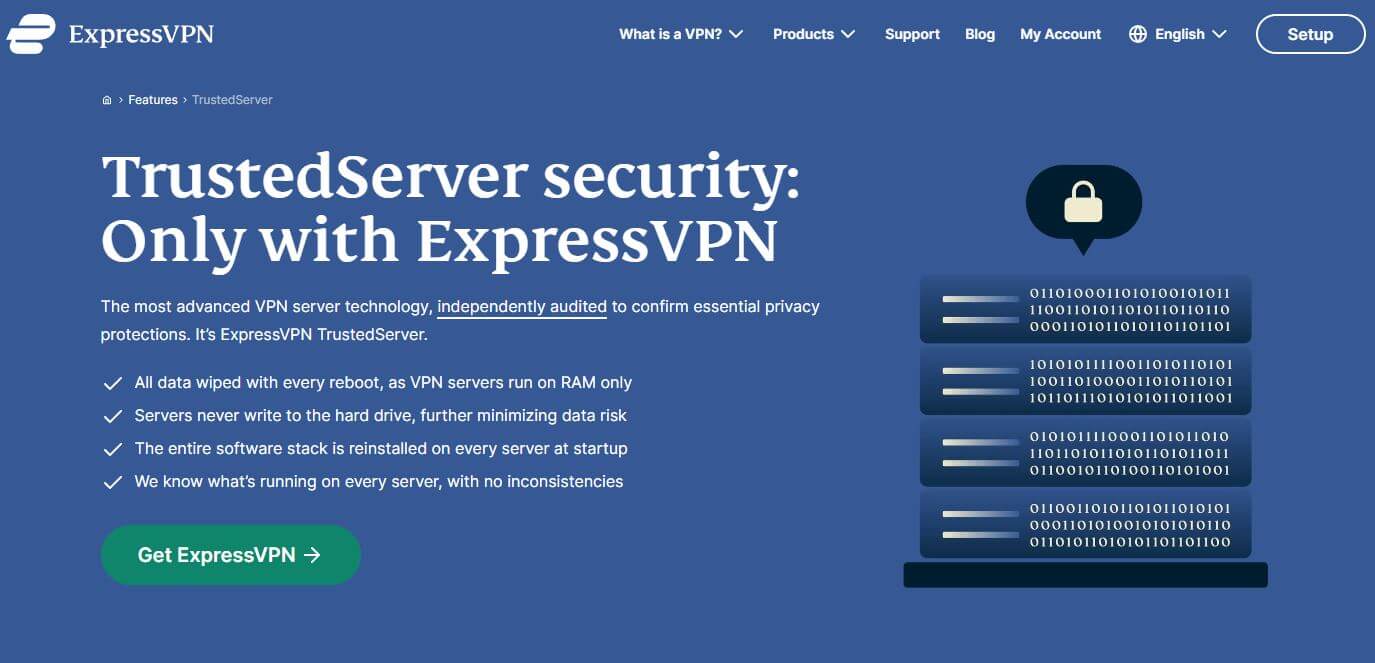
Pros
- AES-256 encryption
- Reliable automatic kill switch
- Private DNS
- Lightway protocol
- Third-party audit by PwC
- No-logs policy
- Obfuscation for working in China
Cons
- Not the most affordable option
ExpressVPN is a provider based in the British Virgin Islands, an offshore location, which represents a great option if you’re after a no-log service. Indeed, the provider comes with a certified no-logging policy and is the most popular option for people looking to stay 100% anonymous online.
Aside from that, ExpressVPN is one of the most technologically advanced providers on the market. It boasts 256-bit AES encryption along with an automatic kill switch, split tunneling, IPv6/DNS leak protection, and even a proprietary Lightway protocol.
We briefly touched on Lightway but haven’t said it’s the best protocol. It offers exceptional performance all while keeping your security in place, which is why users experience absolutely no leaks while using it. Plus, it provides lightning-fast connection speeds, which is always a plus.
Being the most secure VPN provider in 2024, ExpressVPN offers Private DNS as well. Its DNS service stores no logs, making sure you can rely on ExpressVPN to keep you anonymous. ExpressVPN offers something called TrustedServer technology – a fancy name for RAM-based servers.
As explained, these servers ensure your privacy and make sure every bit of user data is wiped with each server restart. Furthermore, the Virtual Private Network has a security audit from PricewaterhouseCoopers, a British company with the best reputation in the business, adding to ExpressVPN’s value.
Aside from Lightway, ExpressVPN supports OpenVPN and has obfuscation, making it a good choice for using this VPN in China or Iran, for example. On mobile devices, there’s a feature called Threat Manager, which blocks malicious sites and trackers – a welcome addition to your privacy.
As you can expect, this is a premium provider, so it requires a subscription. Well, it’s your lucky day if you want to get it, as it offers a special 49% discount and 3 free months for the annual plan, plus a 30-day money-back guarantee. Make sure you check this awesome deal below and try it risk-free!
2. CyberGhost
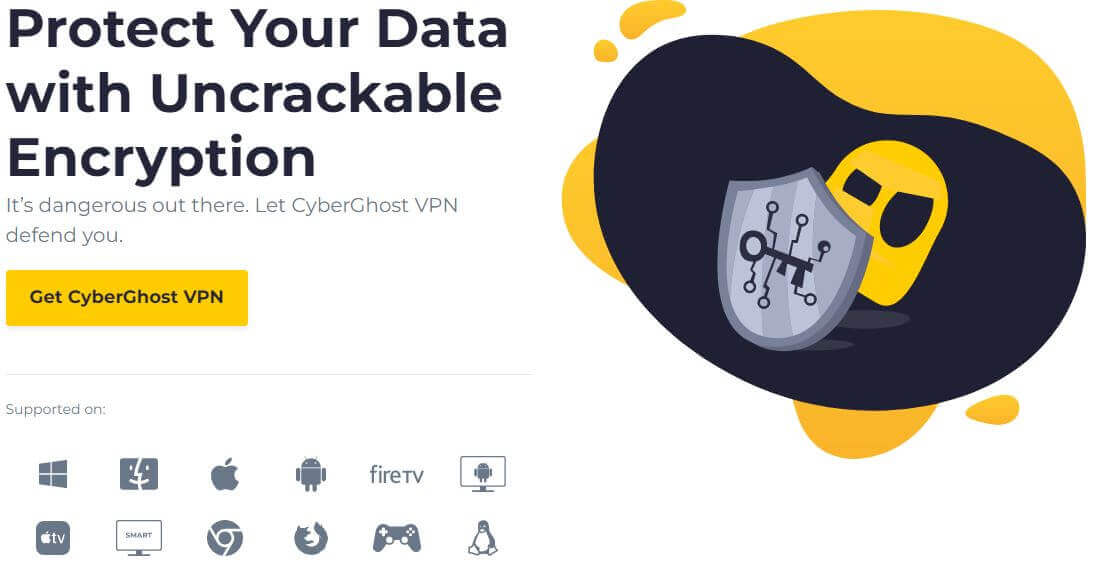
Pros
- Affordable long-term subscription plans
- WireGuard support
- NoSpy servers
- Based in Romania (no-logging policy)
- Transparency reports
- DNS and IPv6 leak protection
Cons
- It offers no obfuscation
- Expensive monthly plan
CyberGhost is a provider that many people admire for its cheap prices that don’t influence the quality negatively. In fact, this VPN is the cheapest on this list, yet, in terms of being safe and reliable, it’s nothing worse than NordVPN or ExpressVPN.
Starting with its jurisdiction, it’s based in Romania, a country with no data-retention laws that respect your privacy. This ensures a no-logging policy and transparency reports that CyberGhost publishes 4 times a year, adding to its trustworthiness by millions of users globally.
CyberGhost comes with bank-grade encryption and you get features like an automatic kill switch, an ad blocker, and WireGuard support. Moreover, the provider supports other secure protocols like IKEv2 and OpenVPN, leaving you with plenty of options to choose from if you’re an advanced user.
I like that the provider sports RAM-based servers too and in its app, you’ll find DNS and IPv6 leak protection, which is necessary for staying secure all the time. This VPN for privacy takes pride in having so-called NoSpy servers.
These servers are based in Romania and are directly operated by this company, which leaves no room for hackers and snoopers to interfere. Connecting to them, you’re even more secure given that the company controls every aspect of these servers to make sure you have no issues.
CyberGhost has only one noticeable downside and that is the fact that it offers no obfuscation. This means it won’t be able to bypass censorship in China or any other similar country. But if you take a look at its pricing, you’ll see a 45-day money-back guarantee for all long-term plans.
Mind you, these long-term plans start at just around $2 a month, which is extremely cheap compared to its rivals. Yet, the provider offers bonus features like dedicated IP addresses and antivirus, both of which cost very little on top of your subscription, making them worth checking out.
3. NordVPN
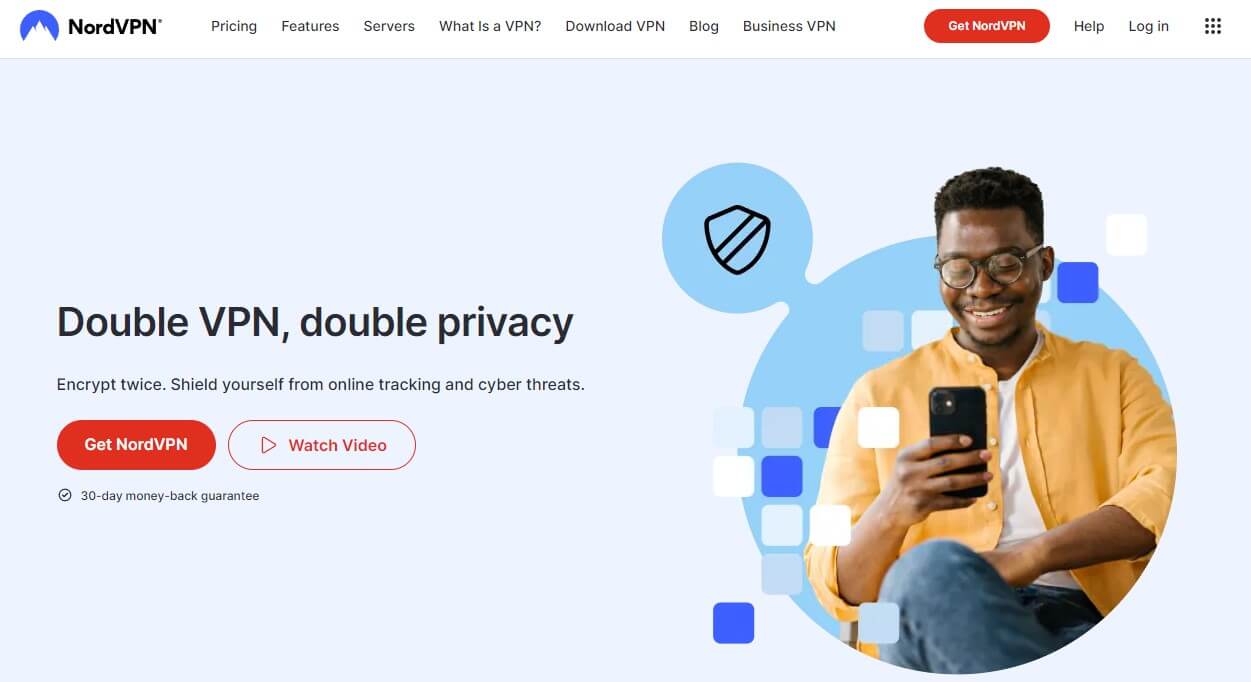
Pros
- Double VPN
- Obfuscated servers
- Threat Protection (antivirus, malware protection & CyberSec)
- Self-managed DNS service
- NordLynx protocol
Cons
- VAT (value-added taxes) in some countries
- Seldom connection issues on Windows
NordVPN is the largest, most popular provider on the planet. While not necessarily the best one, it surely packs a punch security-wise. Being among the safest VPNs, its 256-bit AES encryption along with a kill switch and IP/DNS leak protection is here.
However, NordVPN goes out of its way to include NordLynx, an in-house protocol based on WireGuard, but with many security improvements. This makes NordVPN among the fastest providers too, which perfectly complements its 3-times-audited no-logging policy.
Besides, NordVPN is based in Panama, which is yet another privacy-friendly jurisdiction. It offers modern-looking apps for all platforms in which you can find the Double VPN functionality as well as obfuscated servers that make NordVPN fully functioning in China.
Additionally, the provider offers a proprietary DNS service and all of its servers are based on RAM. Threat Protection is a feature that includes antivirus, malware protection, and CyberSec (ad blocker), making sure online threats won’t harm your computer.
I also like its Dark Web Monitor, which informs you of compromised emails and passwords, letting you take action immediately. NordVPN offers something called Meshnet for hosting/joining secure LAN parties and there are Onion Over VPN servers for exploring the dark web in complete privacy.
Needless to say, NordVPN supports OpenVPN as well and its subscription plans allow you to take advantage of products like NordPass and NordLocker for securing your passwords and files. All of this comes at an affordable price, especially when talking about the longest, 2-year plan.
This, in conjunction with a 30-day money-back guarantee for all plans, makes NordVPN one of the safest and most secure VPNs you can test out risk-free today. Just keep in mind that value-added taxes in some countries can increase the price slightly, which is its only downside.
4. Surfshark
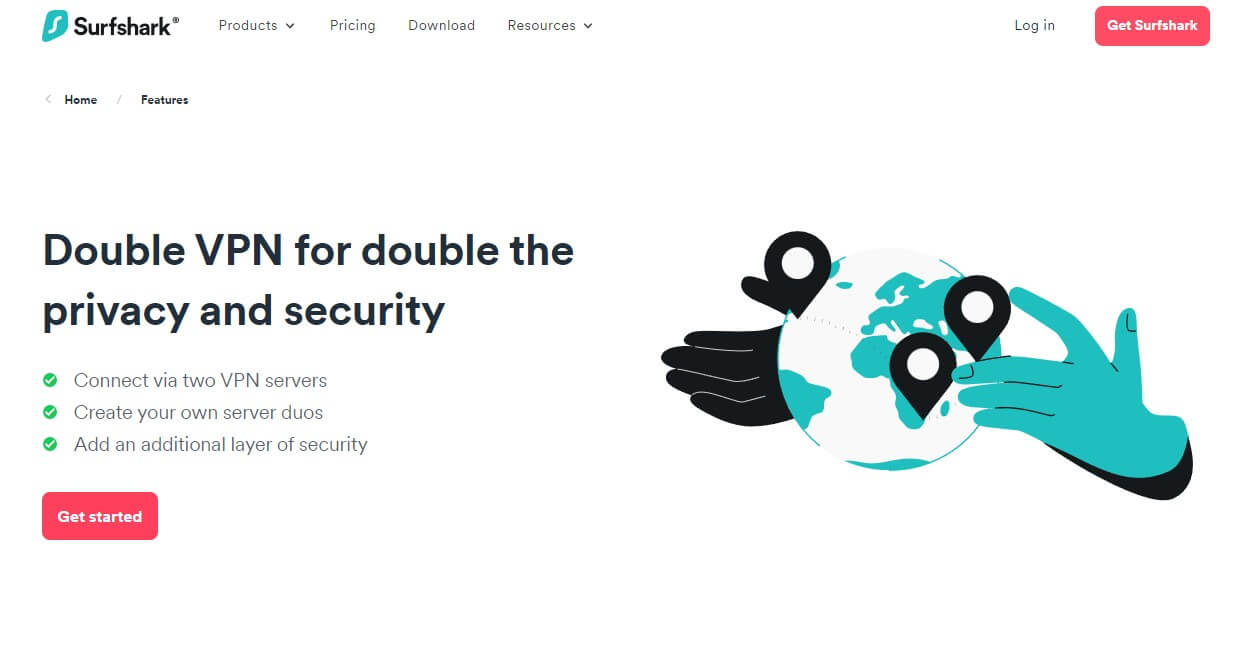
Pros
- Unlimited simultaneous connections
- MultiHop servers
- Several security audits
- Affordable prices
Cons
- Not the best performance
- Expensive 1-month plans
Surfshark is very affordable, and thus, surprisingly safe and secure for some users. Like the other most safe and secure VPNs in 2024, it includes a boatload of functions. First, Surfshark is in the Netherlands but even in this 14 Eyes country, it maintains a no-logs policy.
We love its several security audits from Deloitte and Cure53 that make the VPN extremely trustworthy. Another feature is MultiHop. This one doubles your encryption by routing your traffic through two servers in different countries. Surfshark uses 256-bit encryption.
This is combined with superb IP leak protection and a kill switch. Surfshark includes an ad blocker, and if you pay a bit more, you’ll get an antivirus to protect your device against viruses, malware, trackers, and other unwanted software.
We should mention its RAM-only servers and Private DNS, both of which scream privacy and security. According to our tests, Surfshark shows no DNS leaks and the fact that it stores no logs of your online whereabouts makes it attractive to privacy lovers.
To make things better, the VPN supports unlimited simultaneous connections. This enables you to protect ALL devices and even share your subscription with friends and family. All of you can share the cost as well, so each will end up paying a fraction of a dollar per month.
Now that we’re here, let’s quickly go over the cost of Surfshark. Its cheapest 2-year plan is a speck above $2 a month, which is silly. This price can buy you a seriously safe VPN with streaming/torrenting ability and fast speed, so don’t miss this chance!
5. ProtonVPN
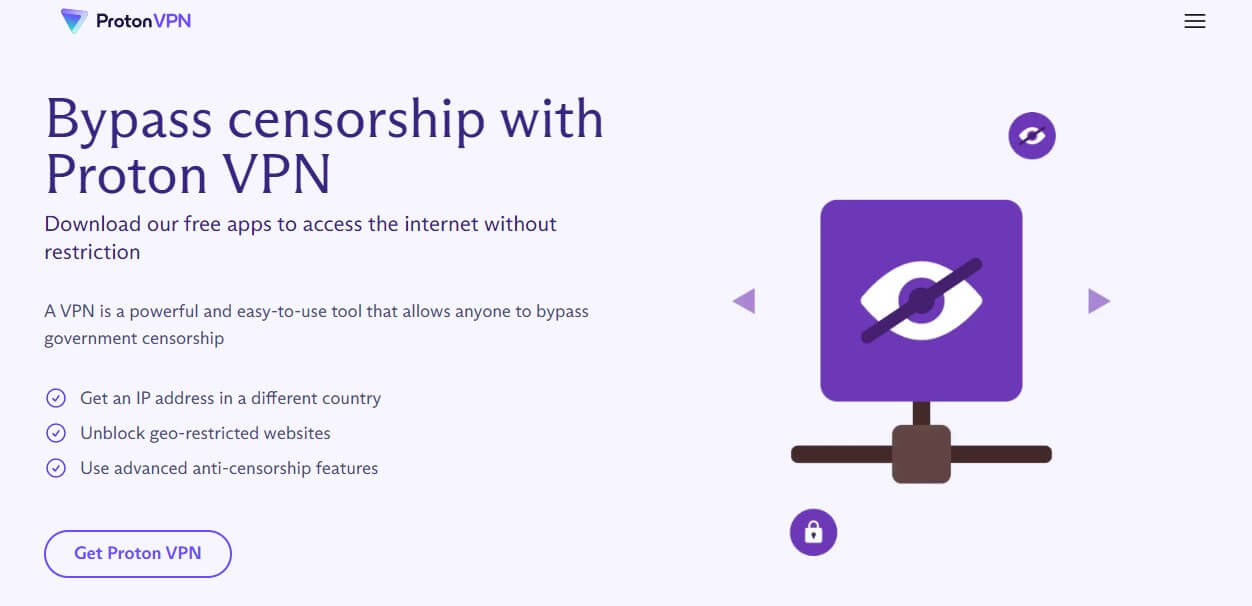
Pros
- Secure Core servers
- Perfect Forward Secrecy
- Includes a kill switch
- NetShield blocks ads
Cons
- Overly expensive
- Average customer support
ProtonVPN is based in Switzerland and we can end our presentation there. Don’t you get it? Switzerland is known for stern privacy laws that ProtonVPN adheres to. This means ZERO logging and some of the most advanced security features.
ProtonVPN comes with Secure Core servers to further enhance your privacy. Then, you have a capable ad-blocker titled NetShield. This one blocks ads and trackers, keeping your online experience clean. We like ProtonVPN’s apps that you can download for free.
Additionally, the VPN includes 10 simultaneous connections and offers the same features in each app. This means you’ll be enjoying bank-grade encryption, split tunneling, and even port forwarding for downloading torrents on any device.
ProtonVPN uses RAM servers – a good base for the most secure VPN in 2024. Also, the VPN’s Private DNS servers ensure your DNS address doesn’t leak to the public eye. We shouldn’t forget about its Perfect Forward Secrecy which prevents encryption keys from being compromised by assigning unique keys to each connection.
ProtonVPN has everything you need for a safe and secure VPN service. It’s fast and works for unblocking Netflix for streaming lovers. Those aspiring to go on the darknet will enjoy full Onion over VPN support. The downside is the price – quite a hefty one.
ProtonVPN’s Swiss roots mean you’ll have to pay for the VPN more. Its 2-year plan is way more expensive than CyberGhost’s equivalent, while the latter is better. However, ProtonVPN’s qualities are undeniable, which is why it still has thousands of users.
Free VPNs: Are They Safe and Secure?
Free services are often demonized for being less safe and secure than their paid counterparts and I can say the scrutiny isn’t without a reason. Free services have far less budget than paid services, so they can’t afford the newest, cutting-edge security features.
This means they offer weaker encryption, no advanced features, only one or two protocols, and no obfuscation. In addition, free VPNs earn money in one of two ways – they either have premium plans that are usually lackluster in quality or they’re “100% free” but they sell user data.
In most cases, the latter case will be more prominent, which is especially true with providers like Hola VPN, Betternet, and even Hotspot Shield. All of them have premium plans, yet, they sell the personal data of their free users to third parties, which is most likely the main source of income.
Aside from weaker security, free VPNs come with slower speeds and limited monthly bandwidth, which makes the entire experience much worse. They also don’t offer in-house DNS services, leaving your traffic vulnerable to third-party DNS services that store logs and track your online activities.
If you’re looking for the most secure VPN, my recommendation is to stay away from free providers. Take advantage of a money-back guarantee in ExpressVPN, CyberGhost, or NordVPN instead, and use these providers for up to 45 days risk-free.
Alternatively, you can check my Atlas VPN review, as it’s a safe provider that offers both free and paid plans. However, it’s nowhere near the five aforementioned providers in terms of quality, so don’t get too disappointed if it’s not to your standards.
The Importance of Having the Safest and Most Secure VPN
Having the most secure VPN that’s very reliable is crucial in 2024. While many people use this service for streaming, more often than not, we’re looking at users who just want to ensure they browse the web privately, without their ISPs breathing behind their necks all the time.
Here’s why is so important to use a safe and secure VPN.
Avoiding Online Tracking
We all know our ISPs are in full control of our IP addresses. Your ISP can see your online activities and infringe on your privacy. Even the authorities in some countries are monitoring user activities directly, and in some instances, they can read your messages and monitor your VoIP calls.
With a safe VPN, you’ll be able to encrypt your connection and make it a garbled mess to anyone trying to read it. This way, you prevent anyone from tracking your online activities, and thus, ensure safe, secure, and private browsing thanks to another IP address from a VPN server.
Torrenting Privately
Torrenting is another case in which using a VPN is mandatory. P2P activities aren’t safe as other users downloading the same torrent can see your IP address and location. Torrent sites are also known for tracking your online activities and download history, which is why concealing your IP is a must.
Thankfully, with the providers we presented, that’s not going to be an issue, as you can fully encrypt your connection and stay anonymous while torrenting.
Ensuring Safety on Public WiFi Networks
On unsafe public WiFi networks, you can expect no encryption or additional security measures that will protect your privacy. Your IP address will be exposed and left for hackers to hijack and steal your credit card info, social media credentials, and whatnot.
However, a VPN’s encrypted tunnel will make the hacker unable to hijack your IP or read your connection. Thanks to impenetrable security, a VPN will ensure your personal data stays personal and your public WiFi usage becomes totally safe and secure.
Avoiding DDoS/Swatting Attacks While Gaming
The most secure VPNs in 2024 will also allow you to play games online without the risk of DDoS, or God forbid, swatting attacks. Gamers can be pretty envious of your victories and great scores, and more skilled gamers can execute a DDoS attack by knowing your IP address.
The same can happen with swatting attacks, with many cases of SWAT teams swarming around people’s houses due to fake reports of terrorist attacks. Through your IP, people can also find out your location but not if you use a Virtual Private Network, which will fully conceal it thanks to an impenetrable encrypted tunnel.
Conclusion
In today’s article, you learned that, despite their claims, not all VPNs are secure. The safest and most secure VPNs like ExpressVPN, CyberGhost, and NordVPN are your best bet if you think online security is of the utmost importance to you.
These providers pack features like AES-256 encryption, IP/DNS leak protection, advanced encryption protocols, and many others. They’ll help you avoid ISP surveillance, cyber-attacks, and various online threats while you explore the internet.
Another important point is the presence of third-party audits or certifications, which makes a particular VPN more trustworthy. All five providers offer them, along with advanced functionalities of Double VPN, ad-blocker, malware protection, and private DNS.
As such, you should have no doubts about what is the most secure and reliable VPN in 2024. With these 5 choices, all you have to do is pick one, encrypt your connection, and surf the internet anonymously.